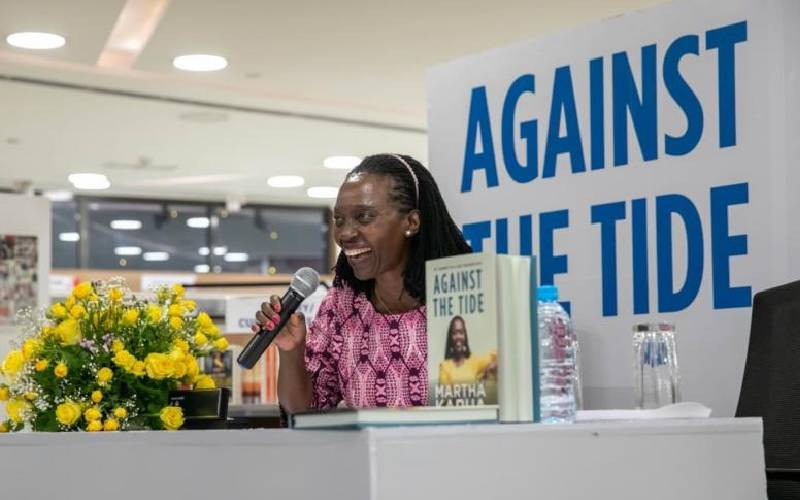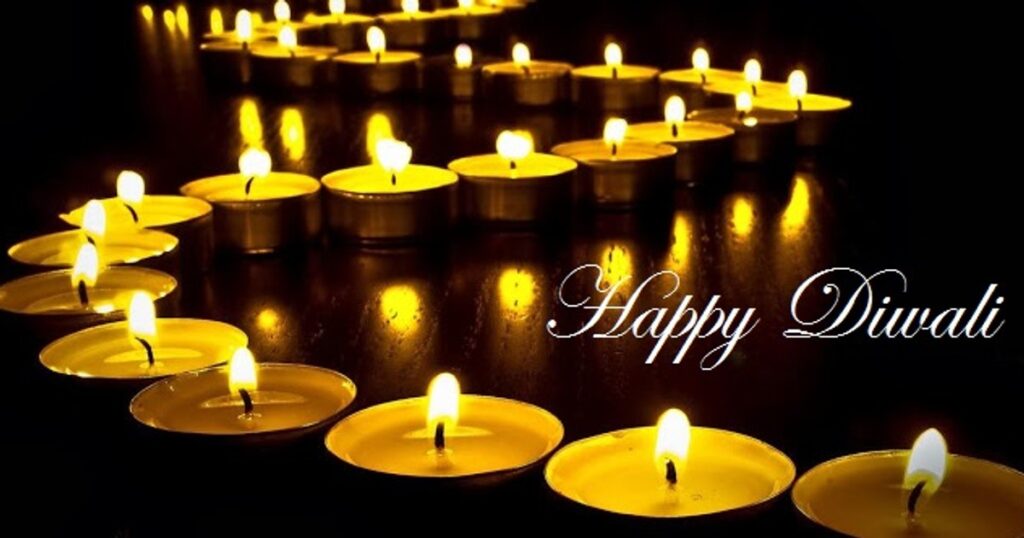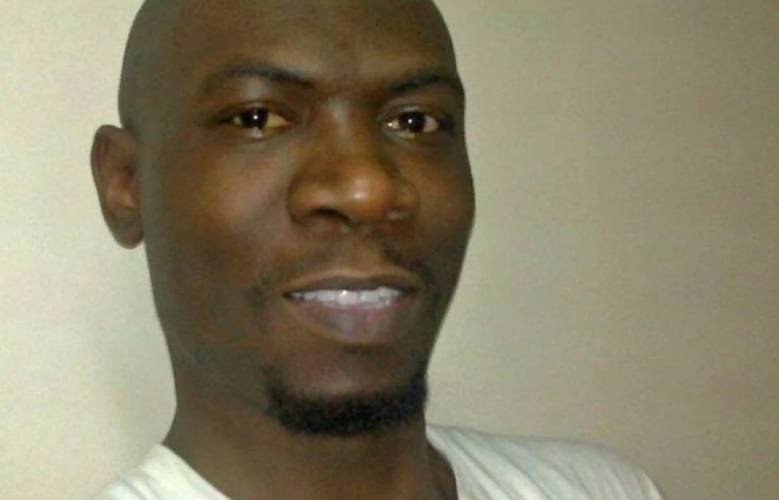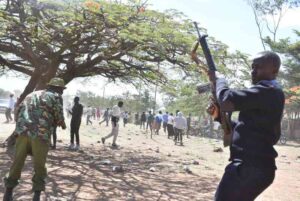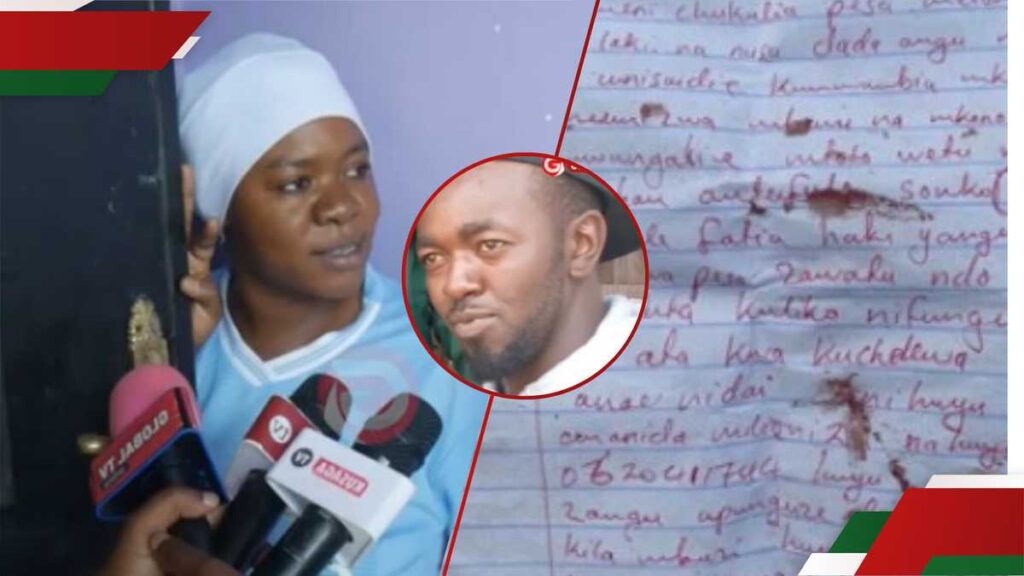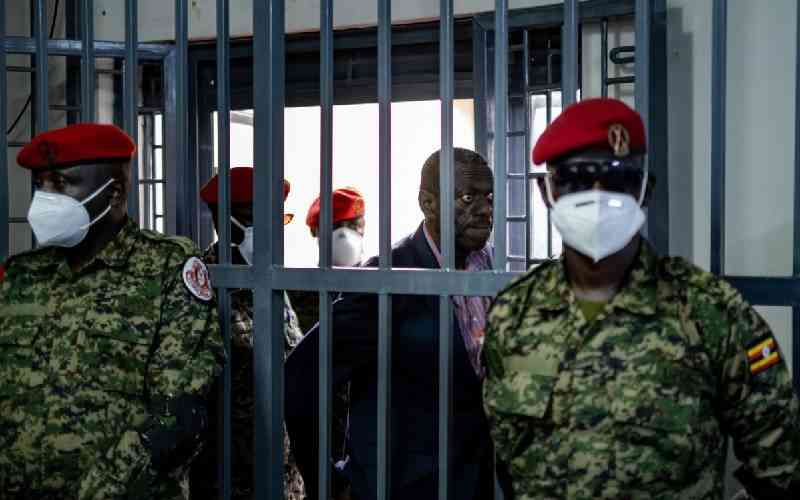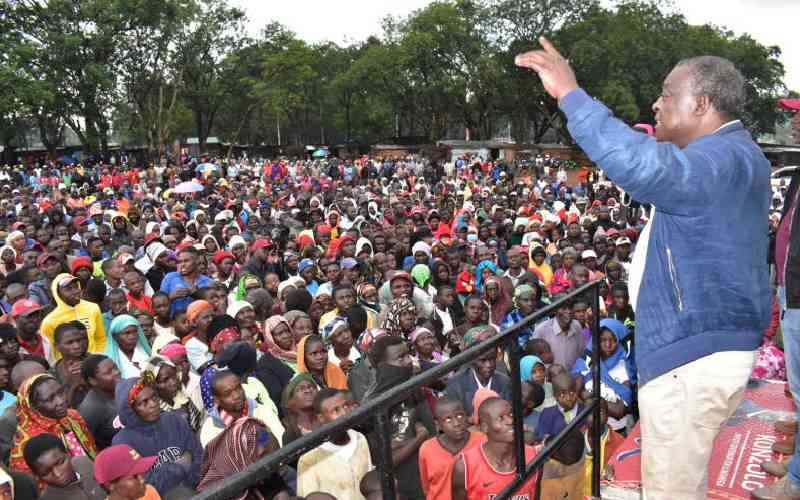If Geoffrey Kariithi, former head of civil service in Kenyatta and Moi governments was a big tree, Martha Karua was the small axe that fell him.
A towering figure not just in Kirinyaga but also nationally, Kariithi had upon retiring from the civil service joined politics, was elected MP Gichugu in 1988 and appointed assistant minister for tourism.
When the winds of change swept the country and multiparty was reintroduced, Kariithi quit KANU, decamping to Ford, which eventually split into Ford Kenya and Ford Asili.
He had no idea that a young lawyer going by the name Martha Njoka, and who had schooled with his daughter Liz, was ready to take him on, and retire him for good.
First they sized up each other in the Ford Asili nominations, and Kariithi got the upper-hand.
Determined, Martha crossed to Democratic Party (DP) and moved for the kill in the main election.
My decision to run was received well by many. However, it was also met with a measure of skepticism by, among others, some of my professional colleagues, who wondered whether I could make it in the murky world of politics.
It did not escape my attention that similar declarations of intent to run by my male colleagues were met with affirmation, not skepticism.
I realised then that even among colleagues, some still considered elective politics a preserve for men. This was but a warning of what lay ahead; double standards in the treatment of women seeking space at the political table.
I remember some of my senior colleagues in the newly formed political party, Ford, opining that I ought to have sought their express support before declaring my intention to run.
I didn’t quite understand why this was necessary since they, too, were first- time aspirants just as I was.
While we could give one another mutual support, I did not understand why I was being treated as the underdog. Thankfully, there were many, especially among the young lawyers, who supported me morally and financially.
My circle of female friends, notably Ms Beatrice Nduta, Martha Koome, Ms Gladwell Wanja Kaara (the late) and Ms Terry Kantai took turns accompanying me to Gichugu for engagements, especially at the introductory stage of my campaign.
In Gichugu, my consolation came mainly from women, the youth and the few men who encouraged and affirmed my candidature and believed in my nascent dream. Family support has been and continues to be the bedrock of the strides I have made in politics and leadership.
Stay informed. Subscribe to our newsletter
My family, especially my parents, endured marginalisation and even outright hostility in social circles, particularly in the early days of my entry into politics.
Despite this, they stood by me. Their solid support helped me through a gruelling and back-breaking campaign against an established competitor, who then enjoyed the support of the local administration and security agencies.
The start of this journey was rough and tough. But who said that life is meant to be easy?
In Ford, curiously, women were hardly ever given opportunities to speak at rallies, despite having seats on the podium, yet men many of whom had name recognition-were given party positions at the drop of a hat, not to mention speaking opportunities that enhanced their visibility wherever we went for campaigns.
I realised that I needed to claim my space or fade into oblivion.
In our first Ford rally in Nairobi, I sat patiently at the dais, waiting for my chance to speak. As I waited, I realised that the master of ceremonies was prioritising politicians who had hurriedly abandoned the ruling party Kanu, to seek space within the ranks of the nascent Opposition.
Suddenly, I heard Geoffrey Kariithi, who had just resigned from Kanu, and his Gichugu parliamentary seat, called to the podium as the next speaker. He was set to be one of my foremost competitors for the Gichugu parliamentary seat.
Changing the narrative
Even though I had already been a long-serving member of the struggle, this fact was being overlooked, and a newcomer was receiving preferential treatment.
I shot up from my seat and briskly walked towards the Master of Ceremony, Kimani Wanyoike as if he had just called out my name
Mr Wanyoike, a renowned political player of the time and an astute politician, on seeing me, realised I was determined to beat the scheme hatched to overshadow me. He at once conveyed “my greetings” to the huge crowd, who reacted with a thunderous applause.
I went up to him, looked him straight in the eye and firmly but politely asked/ him to hand over the microphone to me, and he obliged. I then made a brief address, during which I declared that I would be vying for the Gichugu parliamentary seat.
Although this was a national rally, it was important to me that I lay claim to the territory ahead of anyone else. Kariithi spoke immediately after me without much acclaim from the people.
By then, I was a household name due to my social and political activism. However, I was well aware that name recognition can fade as fast as it rises if not sustained.
Our second Ford rally was in Embu, which neighbours my home county. As I was patiently waiting for my turn to speak, the Master of Ceremonies invited a well-known politician of the day, Waruru Kanja, now deceased, to speak but also announced that the latter would be the last speaker of the day.
I let Kanja walk up to the podium and then followed him. He was a towering figure. When he felt my presence, he turned towards me, and I asked him to kindly hand over the microphone to me as soon as he was done speaking.
I stood behind him and after his address, he handed the mic to me making me the last speaker. Once again, I announced my intention to vie for the, Gichugu parliamentary seat. This was especially significant because there were many people from Gichugu at that rally.
Following my assertive presence in these two rallies, I noticed a shift among the male fraternity occupying the Ford party’s leadership. I was henceforth promptly invited to speak upon arrival at any of our rallies.
It was as if they were getting rid of a nuisance to let the rally settle. Whichever the case, I was happy to claim my space among what I saw as the political brotherhood then dominated by elderly men. This, no doubt, contributed to my eventual success on the ballot.
Ford experienced internal wrangles and split into two parties – Ford Asili led by Kenneth Matiba and Ford Kenya led by Jaramogi Oginga Odinga.
The Kanu regime was only too happy to register the two factions. I opted for Ford Asili. During the Ford Asili party nominations in September 1992, I competed with Kariithi for the position of party chair for Gichugu Constituency.
Beating the scheme
For me, this was a dress rehearsal for the parliamentary election slated for later that year. To my utter horror, the party elections were openly manipulated in favour of Kariithi, prompting me to abandon them midstream.
I lodged a complaint but soon realised redress would be elusive due to the influence my competitor wielded in the top echelons of the Ford Asili party.
In consultation with my strategy team and supporters, I decided to leave Ford Asili and join the Democratic Party of Kenya (DP), led by former Vice President and Finance Minister Mwai Kibaki who had resigned from the ruling party Kanu, on Christmas Eve 1991.
He was then the DP’s presidential flag bearer. I, on the other hand, became the party’s candidate for the Gichugu Constituency following party nominations (primaries). That decision ensured that Kariithi and I would eventually square it out on the ballot.
My children at the time were six and four years old respectively. The campaigns were often characterised by gender-based verbal invective and some- times physical violence by Kariithi’s supporters against mine.
My supporters, including some close relatives involved in my campaigns, were often subjected to harassment. The police were hardly ever receptive to our complaints, which emboldened the attackers.
On nomination day, as was the norm those days, all candidates travelled to Kianyaga, the constituency headquarters, to present their nomination papers to the constituency returning officer. I had the largest crowd among the candidates present.
Harassment, death threats
While this process was ongoing, I was threatened with violence and death by a section of Kariithi’s supporters. I took these threats seriously and changed vehicles as I headed home.
My convoy was attacked just before reaching home. It was not lost on me that the attack targeted the car, which I had used to go to the presentation of nomination papers that morning.
This was, to me, a clear indication that I was the target of the attack. The occupants, including a young woman named Ms Wambura, who had long hair like mine, were attacked with crude weapons, such as machetes and sticks.
Ms Wambura and my cousin, Mr Kibuchi, suffered severe injuries that required hospitalisation.
It was traumatic for everyone, especially my children, to see people soaked in blood as the injured were being ferried to hospital. From that day on, I had to make security arrangements for myself, my convoy and my campaign meetings, having realised that the police had abdicated their duty to protect all without fear or favour.
My security consisted of a few trained but retired security personnel and youth volunteers, many of whom were recruited from among my supporters.
Gender, marital status cards
One of the key issues raised by my main opponent and his campaign team was my marital status. They pushed the narrative that an unmarried or divorced woman was unfit for leadership.
Rather than getting drawn into responding to their provocations, I stayed focused on what truly mattered demonstrating why I was the best candidate to represent Gichugu in Parliament.
I kept my eyes on the ball. My campaign grew stronger each day, which convinced me that I was on the right track. Being a youthful candidate, a majority of the young voters identified with me, making my support base mainly youth and women. With time my support spread across all age groups.
I made it to Parliament, exhausted but proud. The gender and marital cards my detractors had raised against me had not deterred my journey to elective politics.
I became Gichugu’s first elected female MP. I was subsequently re-elected three consecutive times, making me the first MP in my constituency and the county to be elected for four consecutive terms, a record I still held at the time of writing this book.
Our swearing-in ceremony as newly elected MPs was held in the National Assembly three weeks after the elections. I invited my parents to accompany me to the landmark event during which all newly elected members took their oath of office.
Since my marital status had been made a big issue by my competition, I decided to revert to my maiden name immediately after the campaigns.
I prepared the necessary legal instruments and completed the process before the swearing-in ceremony for the newly elected Parliament. Thus, I campaigned as Martha Njoka but was sworn in as Martha Karua.
After the swearing-in, I had the duty to familiarise my constituents and the general public with my change of name. I often tagged along with my children to functions in the constituency, mainly to church on Sundays. I used these occasions to introduce them by their surname, Njoka, and with a light touch, I would point out that my children’s surname was Njoka simply because it was their father’s name.
Name change
I would then conclude by informing them that henceforth, they should address me as Martha Karua for the simple reason that it was my fathers name.
I did not have to do this for long as word of mouth was effective in spreading the message I sought to convey. I similarly changed the name of my legal practice from Martha Njoka and Co. Advocates to Martha Karua and Co Advocates.
The coverage of parliamentary proceedings by the media also greatly helped highlight my change of name. This, as I jokingly told my friends, was to show a bit of style to my detractors who thought that marital status was such a big issue in elective politics.
After our swearing-in, we proceeded on a three-week break before regular parliamentary sittings started. This gave us time for our orientation in parliamentary procedures. It also gave me time to figure out how to juggle between my law practice and my new role as legislator.
I realised that I needed to keep my practice alive for my own and my family’s sustenance. The parliamentary emoluments were so meagre at the time that they could not even cover my house rent, let alone meet other family needs. I kept my practice going as a financial anchor to my daily life and my politics.
House sittings began on Tuesday afternoon and ended on Thursday afternoon every week. Wednesday’s sittings were and still are full day with morning and afternoon sittings. This is considered a four-day working week in the parliamentary calendar. Mondays and Fridays are for constituency tours and committee meetings.
With this routine, I was able to plan when to be at my law firm and to fix any court appearances without affecting my parliamentary work.
I allowed those seeking an audience with me in my capacity as an MP to come to my law firm every Friday afternoon. This was necessary because, in those early days, Parliament did not provide members with offices or support staff.
I rented a constituency office, which I used for both parliamentary and political party work. I had a well-publicised day for constituency consultations every month.
I am glad that today, parliamentarians are provided with offices, both at Parliament Buildings and in their respective constituencies, in addition to researchers and other support staff.
My only regret is that Parliament today is a pale shadow of yesteryears in terms of debate and quality of services to constituents.
The position of Member of Parliament nowadays is a well-paying job, which explains why it is one of the most sought-after in Kenya. Many of the occupants have no call to serve and appear to be there solely for self-aggrandisement.
As a new MP, I had to contend with the reality that even though I had a self-funded constituency office, some constituents still flocked to my home, seeking an audience.
As a result, I made use of my late grandmother’s house as a home office for most of my 20 years in Parliament. I made sure that I developed an understanding with my constituents that consultations at the home office were strictly restricted to daytime and only when I was available.
This worked well, and most of them ended up opting to meet me in the constituency office at Kianyaga, where they were assured of an audience.
Unity of purpose
Only six women had made it to parliament, a drop in the ocean of 188 members. Our number notwithstanding, the six of us cultivated a unity of purpose and worked together as much as we could on issues of mutual interest.
We avoided open conflicts with one another and were conscious of the need to cultivate a united front, lest we undermine our collective agenda of increasing the number of women in leadership and greater gender inclusivity
Our unwritten rule was that we would never publicly attack or undermine one another and that we would collaborate as much as possible on issues affecting us and women in general. This was not easy as there was much hostility between the government and the opposition, which affected our relations in Parliament.
To the credit of the women legislators at that time, we largely upheld our agreement, and when conflicts became unavoidable, one of us would step in to mediate. I had the privilege of playing that role on several occasions.
I immensely enjoyed my work as a representative of the people of Gichugu and the country, as a member of the National Assembly of Kenya. I shall forever be grateful to the people of Gichugu who gave me this opportunity for 20 uninterrupted years.
Life has taught me that you can only do well I in what you like and enjoy. I still look forward to the day I will serve Kenyans nationally and in a bigger capacity.








